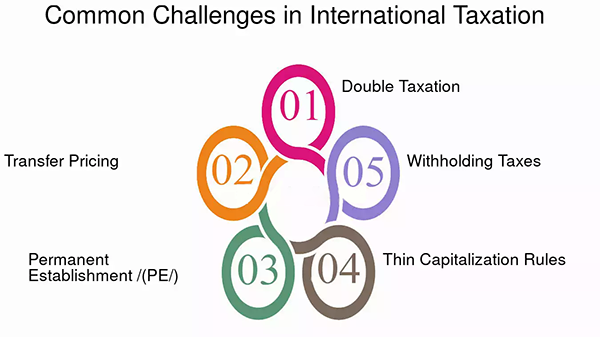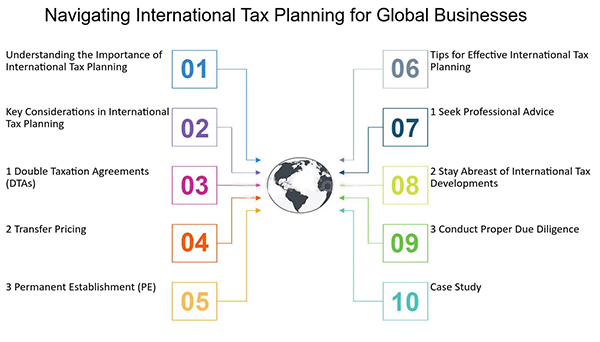The intricate web of international tax laws is often overwhelming for business and seasoned professionals who are operating across borders. And, as each country is coming up with its new set of rules, staying compliant with all of those can be a daunting task.
And, due to this complexity, the global tax gap which represents the difference between the taxes that should be paid or taxes that are actually collected is estimated to be somewhere between $400 billion and $2.4 trillion.
So, this read will be diving deep into the basics of international taxes, along with their common challenges and effective tax planning strategies that can help you optimize global operations.
Let’s start! Also, learn about Understanding the Tax Overhaul in Project 2025 by reading this article.
Understanding The Basics
International taxation is a complex field that is often governed by a myriad of rules and regulations and also varies significantly from country to country. So, here take a look at some fundamental concepts that can help you understand the international taxation system.
- Residency: Residency plays a crucial role in determining the overall tax liabilities of a business. So, if an organization proves their residency in a particular country, this allows them to get taxed on their worldwide income.
- Source-Based Taxation: As the name suggests, source-based taxation is the tax that is often put in the country where the income is generated. For instance, the profits generated in a foreign country will be taxed there only even if the taxpayer is a non-resident.
- Double Taxation: Double taxation is something when the income is taxed in two or more jurisdictions. And, to mitigate the risk of double taxation, countries often come under double taxation agreements (DTAs), which aim to prevent double taxation and promote international trade.
Do You Know?
According to the OECD, over 50% of global trade involves multinational corporations, highlighting the extensive reach and complexity of international taxation.
What Are Some Common Challenges of International Taxes?

For businesses operating on a global level, there are a myriad of tax challenges that are often complex and costly for them. And, this is why it is essential to understand these challenges to efficiently optimize the tax liabilities. So, here are some of the common challenges that businesses often face:
- Transfer Pricing: These are the rules and methods of determining the actual price of the goods or services that are transferred between the related entities. This ensures that the profits are allocated to the jurisdictions where the economic activity took place.
- Controlled foreign corporations (CFCs): a CFC is a corporate entity that aims to prevent individuals and companies from cleverly shifting their income streams to low or no jurisdictions.
- Permanent Establishments (PEs): A PE is a fixed place from where a business conducts most of its major activities. This is particularly challenging for businesses with multiple jurisdictions.
- Thin Capitalization: These are some rules that prevent a company from artificially inflating its debt-to-equality ratio to reduce its taxable profits. It does this by limiting the amount of interest dedication that a company is allowed to claim.
Strategies For Effective International Tax Planning

For all the businesses that are operating in multiple jurisdictions, effective tax planning can be a helpful way to reduce some significant tax burdens and improve the global competitiveness of their company. So, here look at some key strategies that can be employed to achieve these goals.
- Entity Selection And Structuring: Opting for the right entity is crucial for your international operations. Some factors you may need to consider while choosing one include the nature of your business, the jurisdiction where your company operates, along its long-term goals.
Some of the common entities that can be used to manage international operations include foreign subsidiaries that are used to isolate business activities in specific jurisdictions. International holding companies that are often used hold investments in foreign subsidiaries, which is also a tax advantage.
- Accurate Transfer Pricing: Transfer pricing includes the accurate prices charged by the related parties for all the goods and services. This provides an opportunity to avoid any kind of double taxation and ensure compliance with tax laws.
- Treaties For Double Taxation: Countries often come under a double taxation treaty to prevent businesses from getting taxed twice on the same income. These treaties include the tax credit provisions to help reduce the overall tax burden.
- Tax Incentives and Deductions: To stimulate economic growth and attract foreign investment, many countries are now offering tax incentives and deductions. This is why it is important to do proper research to identify the available jurisdictions where you operate.
So, for all the companies who are conducting most of their business operations in the UAE, seeking expert advice from UAE tax specialists will ensure proper compliance with the local tax regulations, while also helping you avoid costly mistakes.
The Bottom Line
In brief, navigating the complex world of international taxes requires a deep combination of knowledge, planning, and adaptability. And, by understanding all the fundamentals of international taxes, businesses can effectively manage their tax obligations and unlock some great opportunities for sustainable growth in the global economy.






